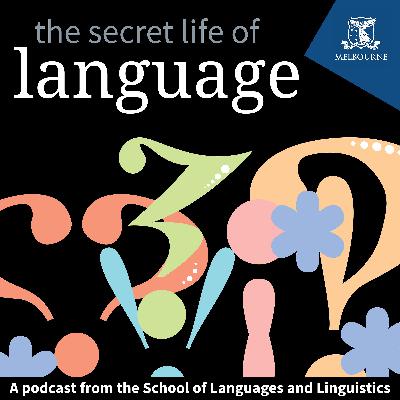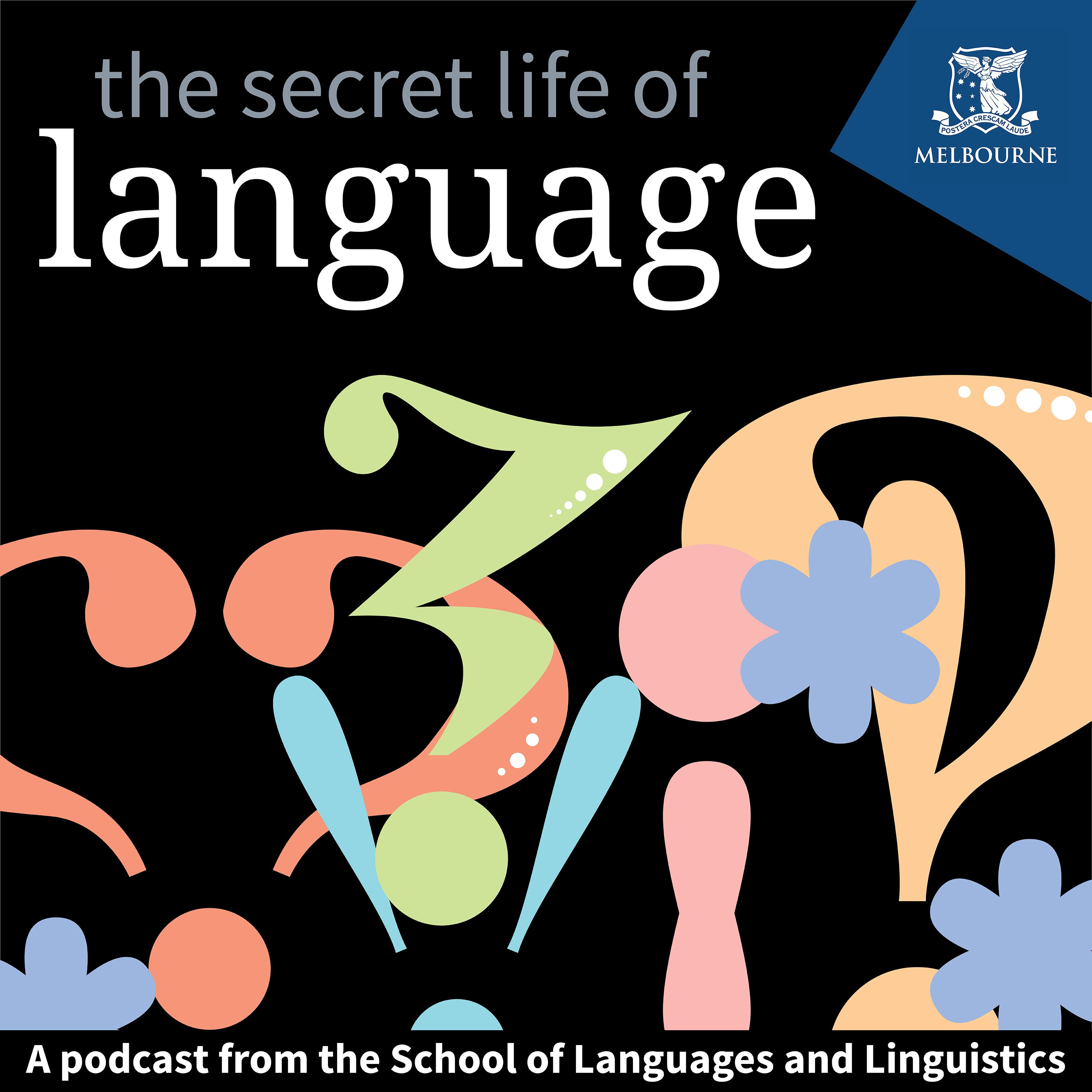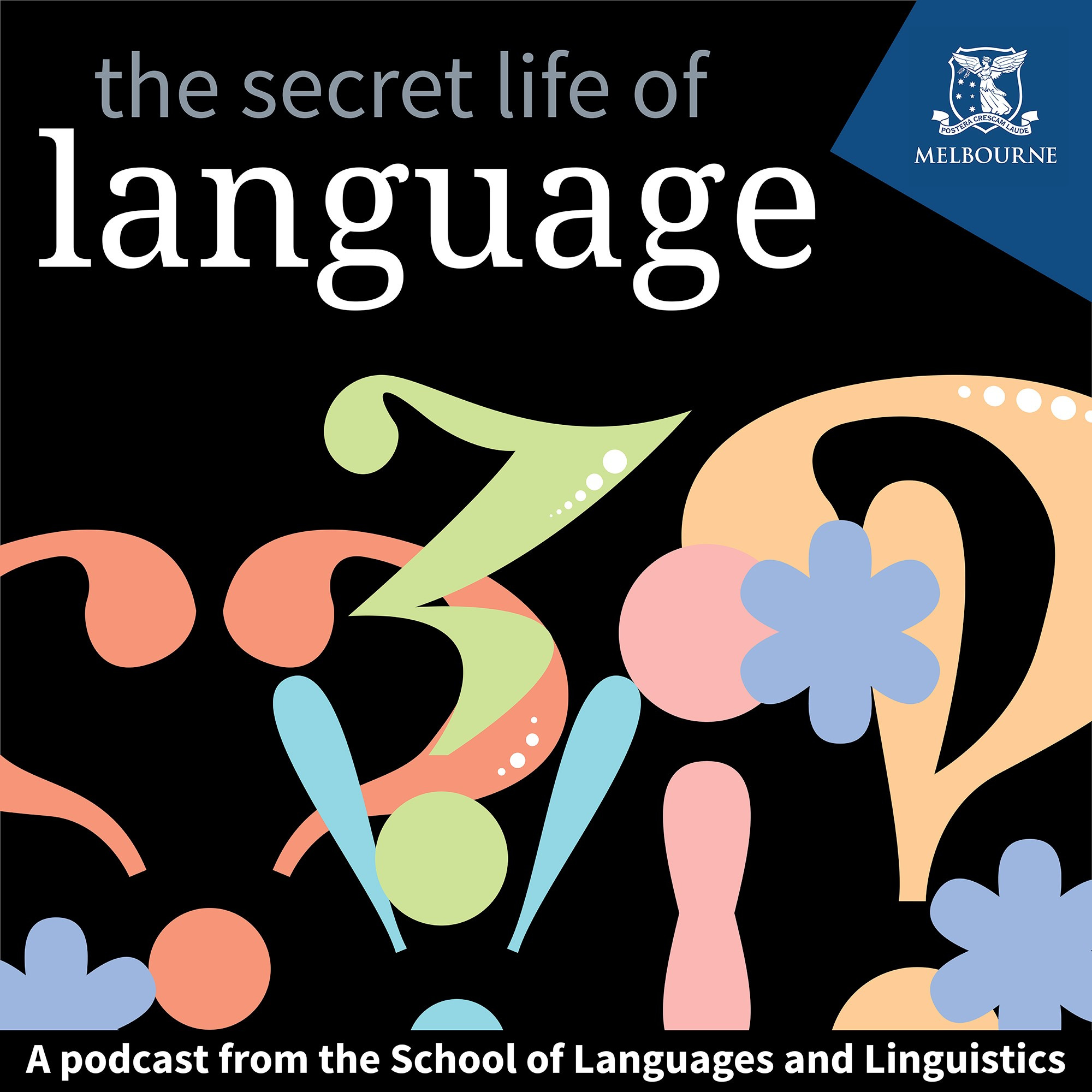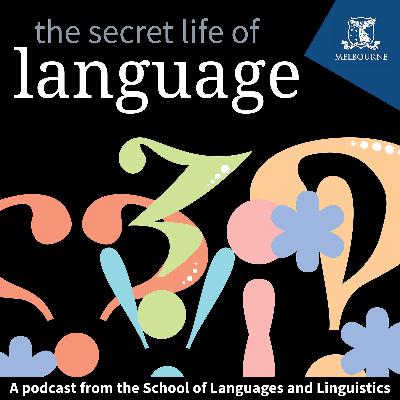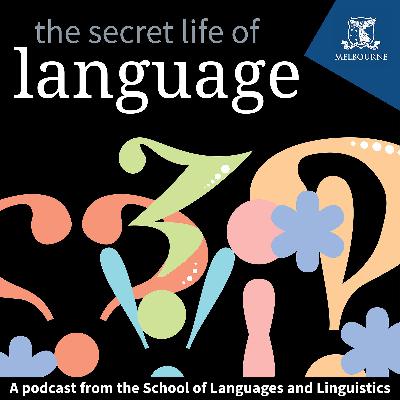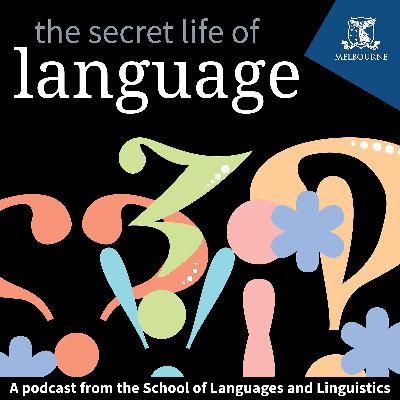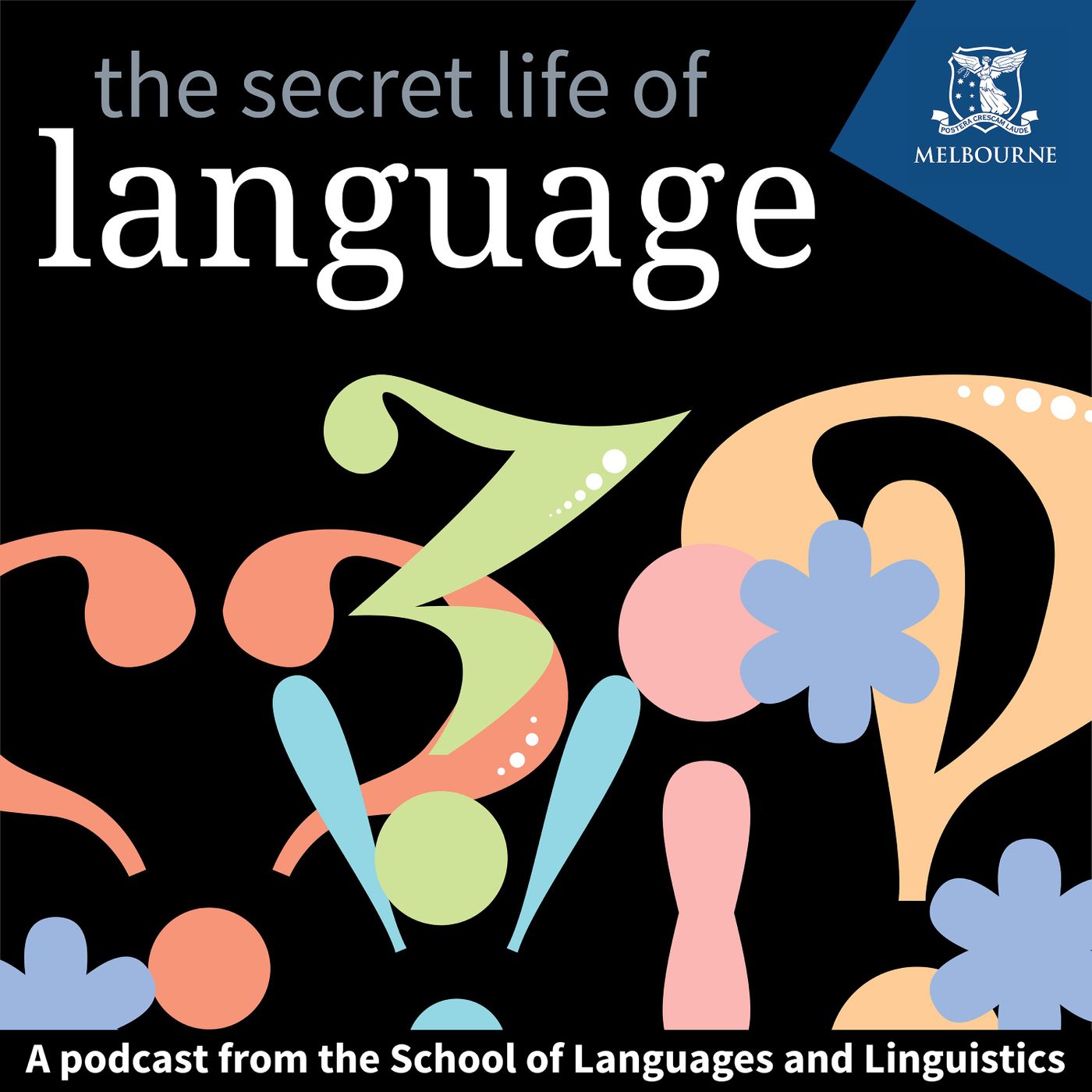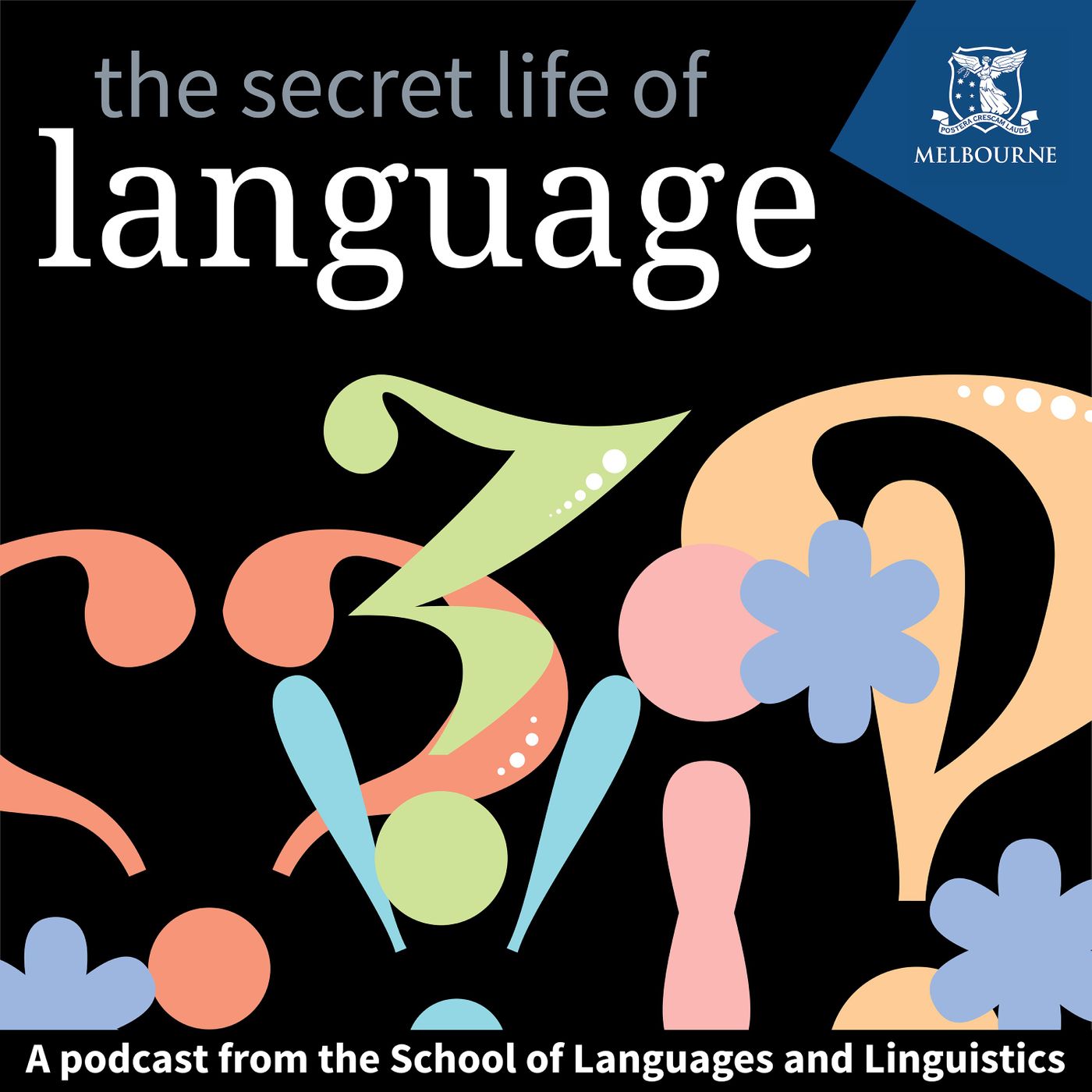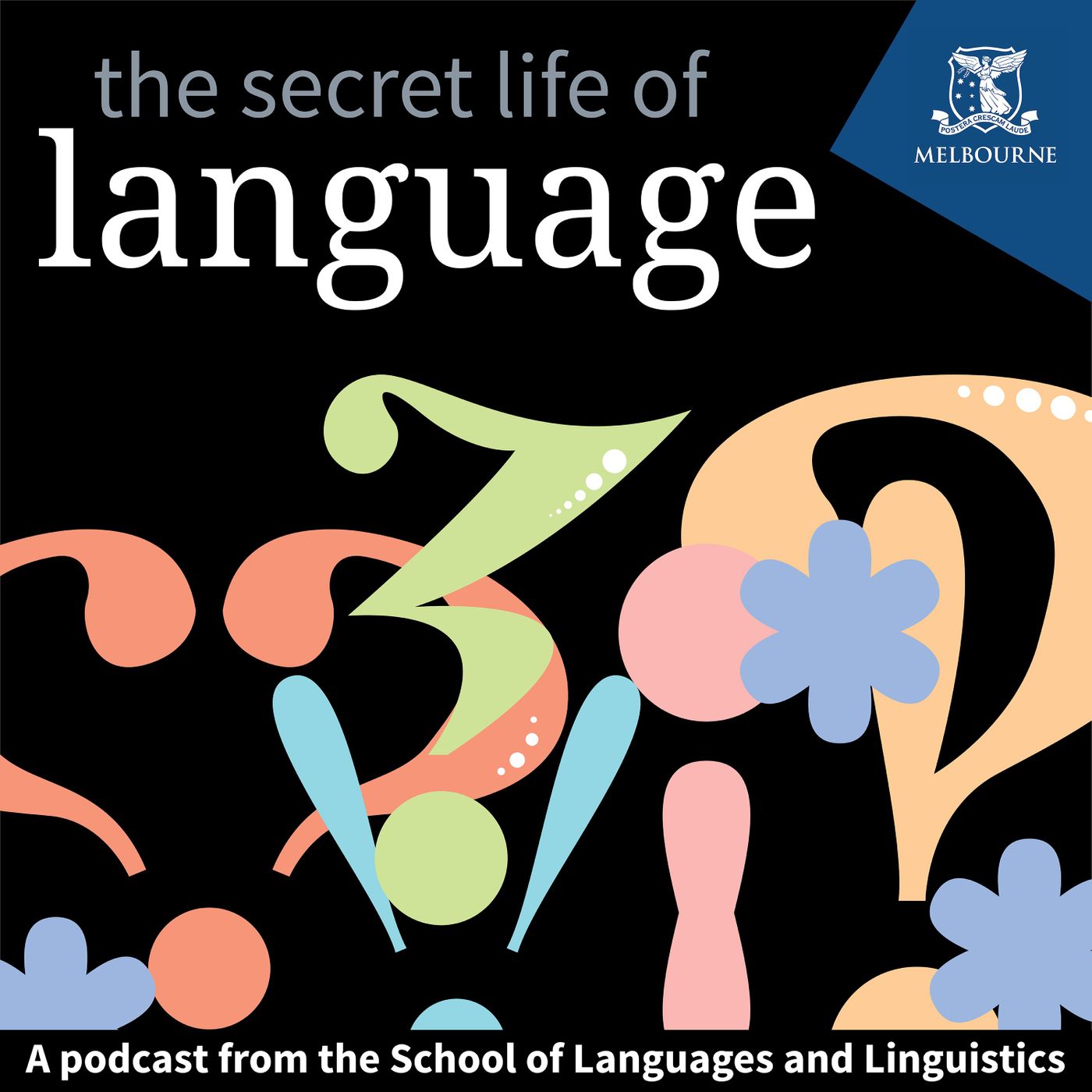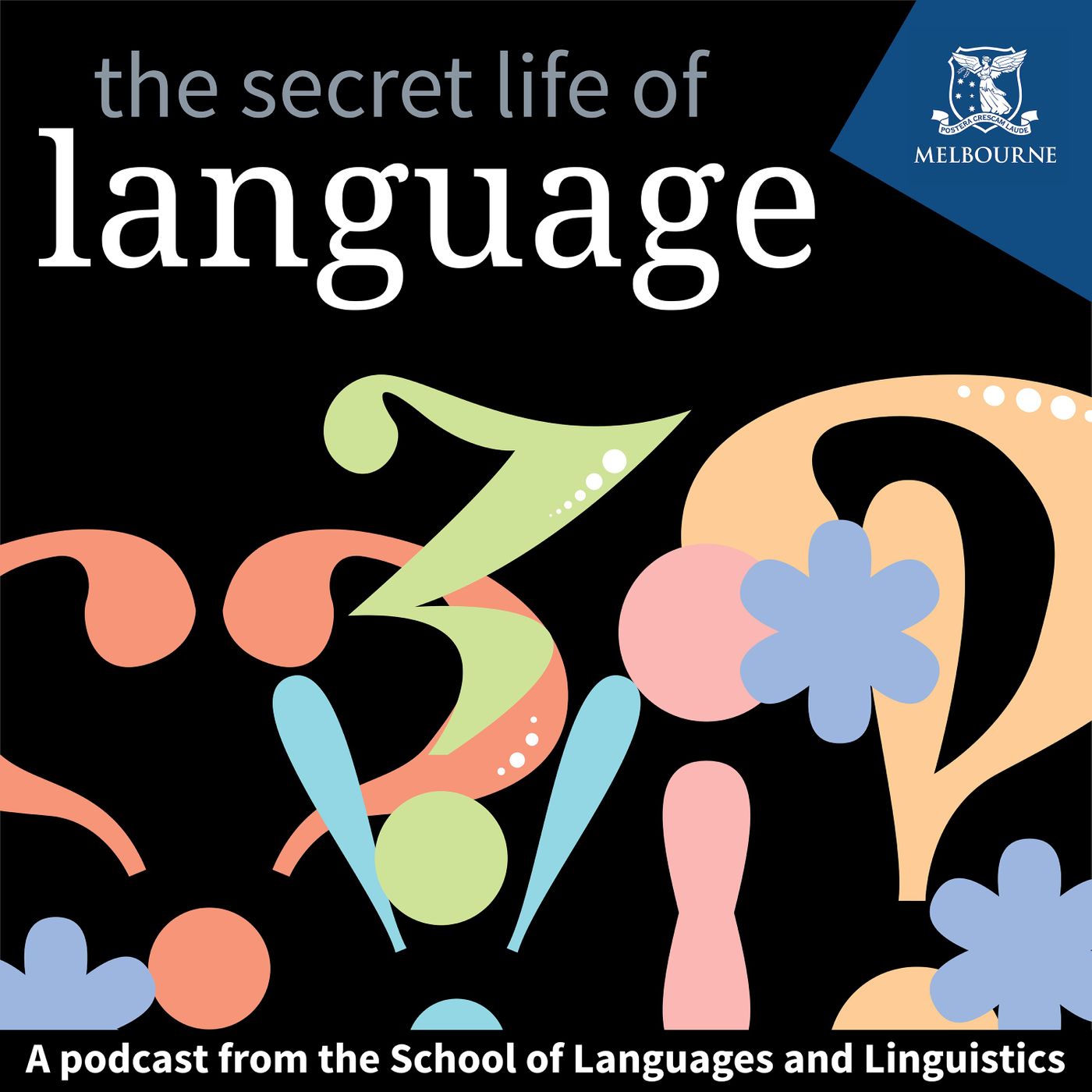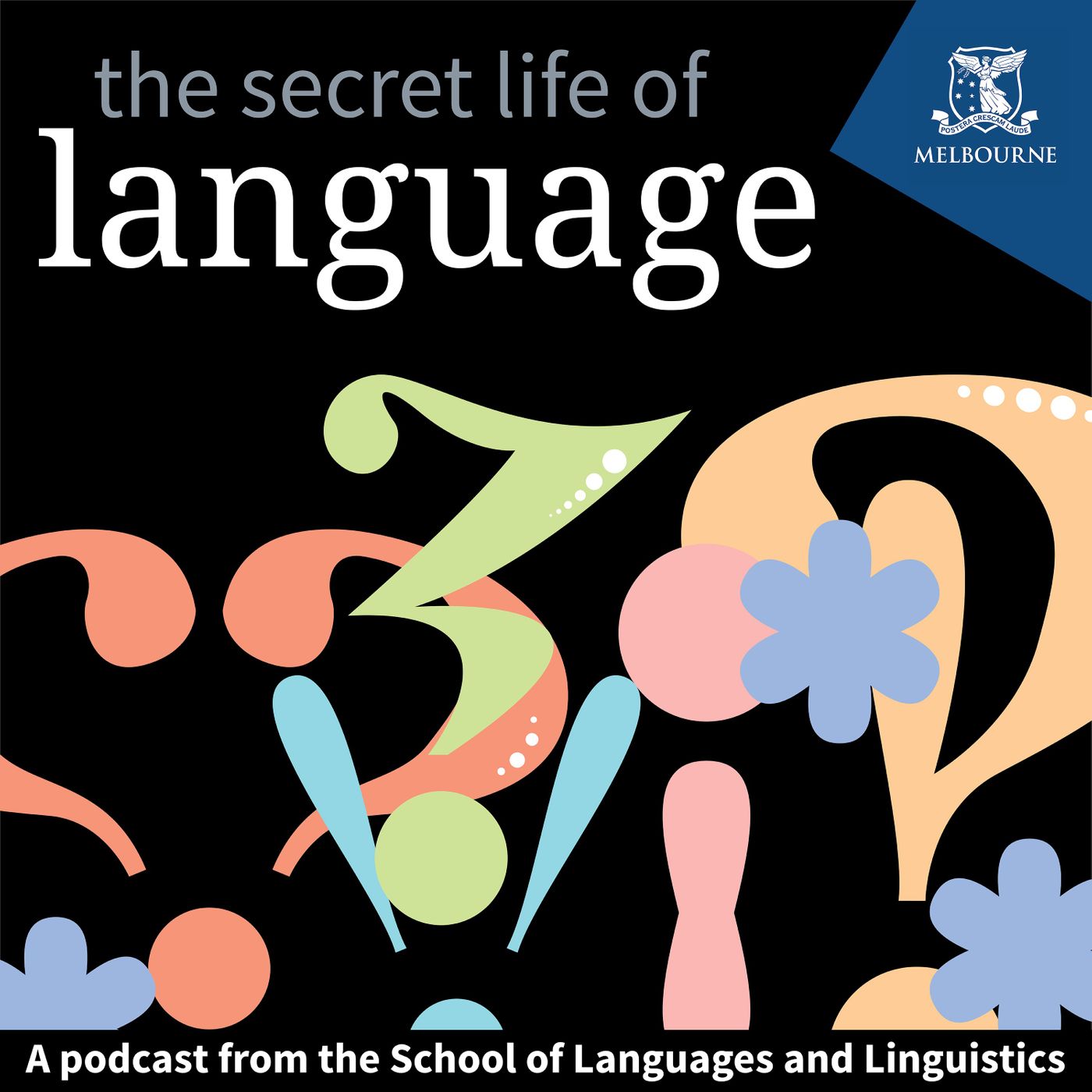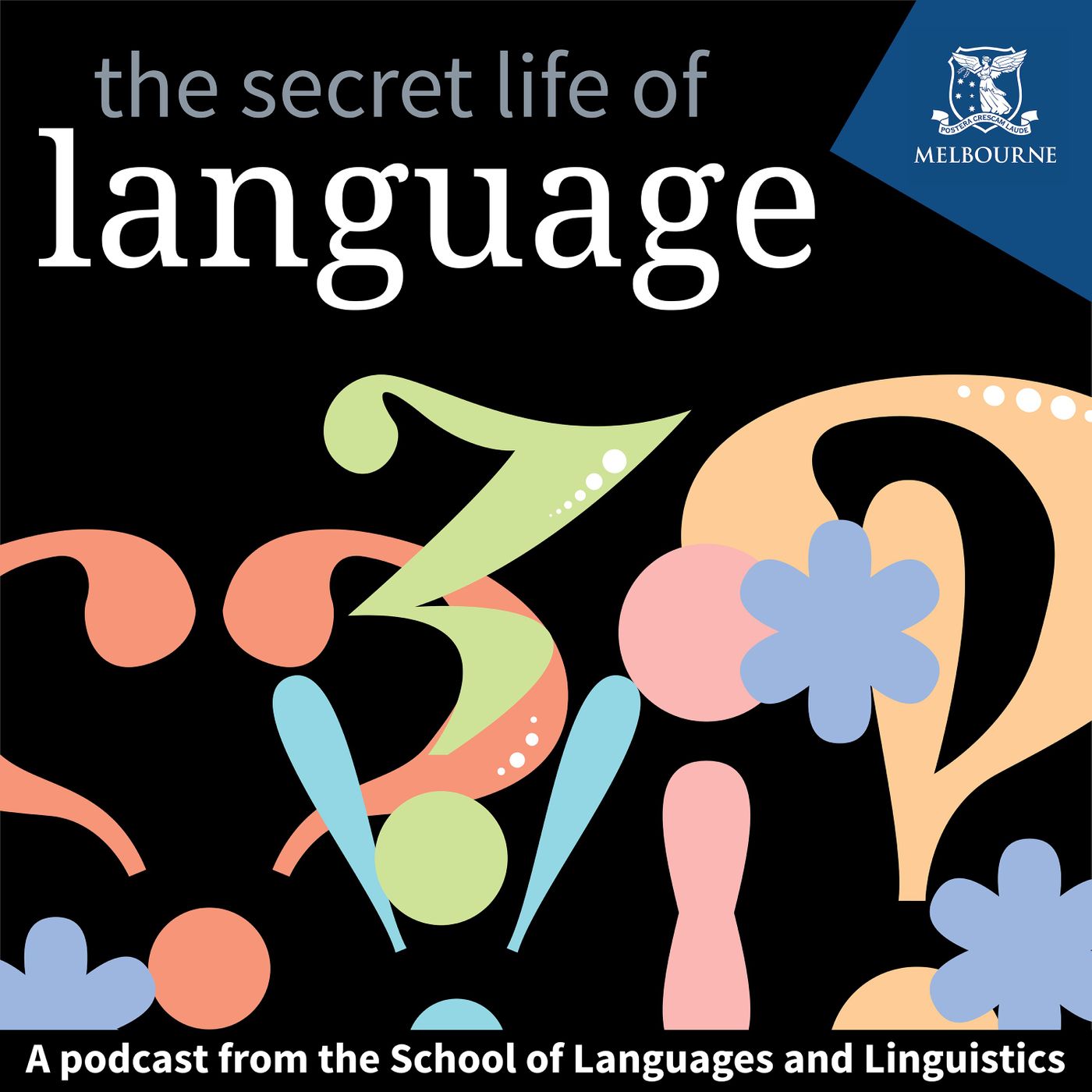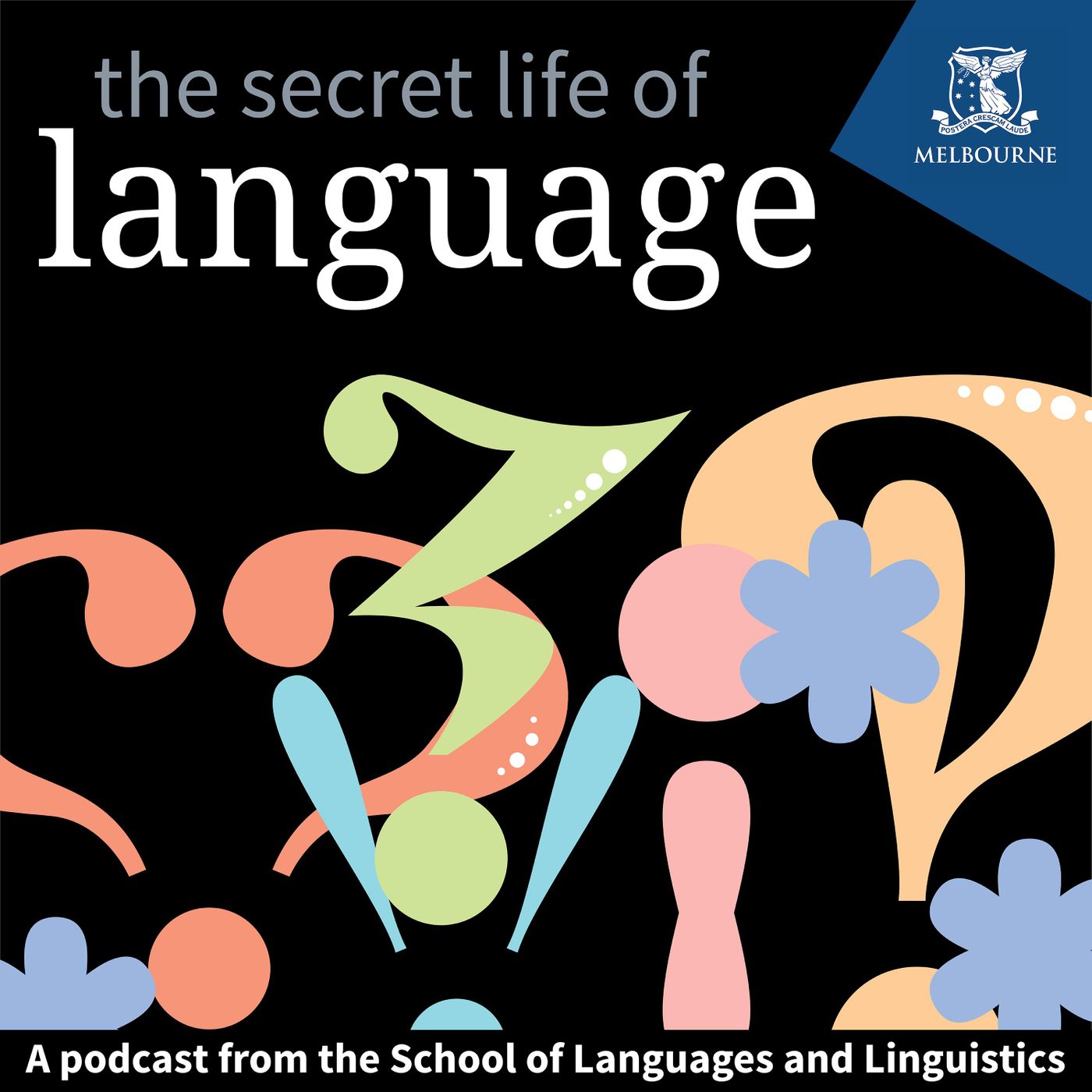Discover The Secret Life of Language
The Secret Life of Language

The Secret Life of Language
Author: School of Languages and Linguistics - The University of Melbourne
Subscribed: 66Played: 706Subscribe
Share
© Creative Commons BY-NC-SA
Description
The Secret Life of Language dives into the cultures, arts, and histories that underpin and inform the diverse languages we speak. From the studios of the University of Melbourne’s School of Languages and Linguistics.
24 Episodes
Reverse
In this bonus episode of Choc-tops and Cassata, Elisabetta and Mark call on their co-host Santo to justify his bold claim from part 3 of Choc-tops that The Castle – the much-loved classic Australian comedy which he co-wrote – is, in fact, an ‘Italian film’. In this series, Choc-tops and Cassata, part of The Secret Life of Language, hosts Elisabetta Ferrari (Italian Studies Program) and Mark Nicholls (Screen and Cultural Studies) are joined by comedian, writer and producer Santo Cilauro to dig into the ways Italian language films shaped the cultural life of Melbourne.In making a case for The Castle’s italianità (Italianness), Santo shares memories of the collaborative screenwriting process with Rob Sitch, Tom Gleisner and Jane Kennedy, reminiscing about shooting on a shoestring budget. He recalls how the writers drew directly from their own families to capture those moments of warmth, chaos and loyalty that give this unique film its charm. They discuss the quirkiness of the film’s characters and their ability to delight in life’s small pleasures in an honest and unpretentious way.Santo also reveals why an Italian language version of the film was nearly made but fell over due to one big cultural difference.Choc-tops and Cassata is a mini-series of The Secret Life of Language, a podcast from the University of Melbourne’s School of Languages and Linguistics. The series is produced and edited by Elisabetta Ferrari, Alice Garner and Gavin Nebauer. Recorded and mixed by Gavin Nebauer at the Horwood Recording Studio, the University of Melbourne.Choc-tops and Cassata is made with support from ACIS (Australasian Centre for Italian Studies)If you have any stories or info about the Melbourne cinema scene as discussed in the podcast, please feel free to contact us at italian.cinemas.project@gmail.comThe Secret Life of Language is licensed under Creative Commons.
Antonio Zeccola, founder and owner of Australia’s largest independent cinema chain, Palace Cinemas, joins Santo, Elisabetta and Mark to talk about the early days of running Italian language cinemas in Melbourne. He sheds light on the sourcing, exhibition and distribution of Italian films for suburban cinemas and explores how Melbourne’s cultural landscape was transformed along the way.In this series, Choc-tops and Cassata, part of The Secret Life of Language, hosts Elisabetta Ferrari (Italian Studies Program) and Mark Nicholls (Screen and Cultural Studies) are joined by comedian, writer and producer Santo Cilauro to dig into the ways Italian language films shaped the cultural life of Melbourne.Antonio shares his back story, including his father’s small theatre and cinema in Naples and his uncle’s prisoner of war experience in Australia, and explains how at nineteen, he came to run his first cinema in Noble Park (the Pix) and later the Metropolitan in Brunswick.He recounts big hits like The Ten Commandments and the comedies of Franco Franchi e Ciccio Ingrassia, competition with other Italian suburban cinemas, the evolution of Palace, the daily challenge of staying afloat financially and his part in the development of film festivals in Australia.Choc-tops and Cassata is a mini-series of The Secret Life of Language, a podcast from the University of Melbourne’s School of Languages and Linguistics. The series is produced and edited by Elisabetta Ferrari, Alice Garner and Gavin Nebauer. Recorded and mixed by Gavin Nebauer at the Horwood Recording Studio, the University of Melbourne.Choc-tops and Cassata is made with support from ACIS (Australasian Centre for Italian Studies)If you have any stories or info about the Melbourne cinema scene as discussed in the podcast, please feel free to contact us at italian.cinemas.project@gmail.comThe Secret Life of Language is licensed under Creative Commons.
Acclaimed Italo-Australian screenwriter and director Jan Sardi joins the Choc-tops and Cassata team to reflect on how Melbourne’s Italian social and cultural landscape has shaped his work in cinema.In this series, Choc-tops and Cassata, part of The Secret Life of Language, hosts Elisabetta Ferrari (Italian Studies Program) and Mark Nicholls (Screen and Cultural Studies) are joined by comedian, writer and producer Santo Cilauro to dig into the ways Italian language films shaped the cultural life of Melbourne.Starting with his grandparents’ migration from the island of Elba and experiences on the Queensland canefields, Jan takes us to glamorous floorshows and Hollywood filmstars at Mario’s restaurant in Melbourne, where his father worked. He revisits his childhood obsession with Westerns screened at the Adelphi (now the San Remo Ballroom) and the discovery of Italian stars like Sophia Loren and Gina Lollobrigida. Screenwriter of movies such as Moving Out and Oscar nominated Shine, he also talks about his directorial debut in Love's Brother, his time as a teacher and how one of his high school students, Vince Colosimo, came to be cast in Moving Out.Choc-tops and Cassata is a mini-series of The Secret Life of Language, a podcast from the University of Melbourne’s School of Languages and Linguistics. The series was produced and edited by Elisabetta Ferrari, Alice Garner and Gavin Nebauer. Recorded and mixed by Gavin Nebauer at the Horwood Recording Studio, the University of Melbourne.Choc-tops and Cassata is made with support from ACIS (Australasian Centre for Italian Studies)If you have any stories or info about the Melbourne cinema scene as discussed in the podcast, please feel free to contact us at italian.cinemas.project@gmail.comThe Secret Life of Language is licensed under Creative Commons.
Melbourne cinemas provided an invaluable opportunity for the Italian community to gather and speak and hear their language, in a time when very little non-English media was available. When SBS and video came along, everything changed.In this series, Choc-tops and Cassata, part of The Secret Life of Language, hosts Elisabetta Ferrari (Italian Studies Program) and Mark Nicholls (Screen and Cultural Studies) are joined by comedian, writer and producer Santo Cilauro to dig into the ways Italian language films shaped the cultural life of Melbourne.In this episode of Choc-tops and Cassata, guests Carlo and Giovanni Zeccola invite our hosts to step back into the 1970s and join them on a lively Saturday night at the Metropolitan. Their family ran this Italian language cinema in Melbourne’s inner northern suburb of Brunswick from the late 1960s to the early ‘80s. Patrons rolled up at the grand 1920s-era, 1800-seat theatre dressed in their finest, ordering cassata and orange cordial from a very young Giovanni, who ushered them to their seats.Choc-tops and Cassata is a mini-series of The Secret Life of Language, a podcast from the University of Melbourne’s School of Languages and Linguistics. The series was produced and edited by Elisabetta Ferrari, Alice Garner and Gavin Nebauer. Recorded and mixed by Gavin Nebauer at the Horwood Recording Studio, the University of Melbourne.Choc-tops and Cassata is made with support from ACIS (Australasian Centre for Italian Studies)If you have any stories or info about the Melbourne cinema scene as discussed in the podcast, please feel free to contact us at italian.cinemas.project@gmail.comThe Secret Life of Language is licensed under Creative Commons.
Italian film nights in 1950's -1970's Melbourne were an excuse for a multigenerational night out. Movie screenings brought places, faces and voices from the old country to a hungry audience. But they also helped save some of Melbourne’s favourite suburban cinemas from demolition.In this series, Choc-tops and Cassata, part of The Secret Life of Language, hosts Elisabetta Ferrari (Italian Studies Program) and Mark Nicholls (Screen and Cultural Studies) are joined by comedian, writer and producer Santo Cilauro to dig into the ways Italian language films shaped the cultural life of Melbourne.In this episode, we speak with Gus Berger, cinema owner-operator and producer of the documentary The Lost City of Melbourne. Gus explains how suburban cinemas fit into the big picture of Melbourne’s mid-20th-century urban redevelopment and demolition frenzy.The trio discuss cheap rent and architectural marvels, including the Metropolitan Cinema’s space age ticket booth, and bemoan the gap in the photographic archive. We also discuss the impact of the introduction of Television in general, but especially the multicultural public tv network, SBS, launching on to our tv screens in 1979.Choc-tops and Cassata is a mini-series of The Secret Life of Language, a podcast from the University of Melbourne’s School of Languages and Linguistics. The series was produced and edited by Elisabetta Ferrari, Alice Garner and Gavin Nebauer. Recorded and mixed by Gavin Nebauer at the Horwood Recording Studio, the University of Melbourne.Choc-tops and Cassata is made with support from ACIS (Australasian Centre for Italian Studies)If you have any stories or info about the Melbourne cinema scene as discussed in the podcast, please feel free to contact us at italian.cinemas.project@gmail.comThe Secret Life of Language is licensed under Creative Commons.
Santo Cilauro joins University of Melbourne Italian and Screen Studies scholars Elisabetta Ferrari and Mark Nicholls to explore the role Italian migrants played in keeping Melbourne’s cinema culture alive. Featuring prominent guests who helped to shape the scene, join us for a fun filled journey back to the golden era of cinema in Melbourne.Choc Tops and Cassata a new series, part of The Secret Life of Language Podcast. Coming mid-July 2025!The Secret Life of Language is a podcast series from the studios of the University of Melbourne's School of Languages and Linguistics.
Is generative AI a disruptive force or an opportunity for those who work with languages? As genAI and machine learning technologies remake the translation industry, what does it mean for the career prospects of professional translators? And can AI be harnessed to preserve and revitalize the world's linguistic diversity?In this episode of The Secret Life of Language, we look at the impact of genAI in a domain close to our hearts: languages and linguistics. First up, hosts Prof John Hajek and Dr Yu Hao are joined by translators and translation studies researchers Prof Anthony Pym and Elise Qing to look at how both the practice and the business of translation and interpretation have been upended by AI, and what we can expect next. John and Yu then have a couple of encounters with recent generative AI products demonstrating the cutting edge of real-time spoken conversation and instant voice translation. Finally, we speak with indigenous languages researcher and computer scientist Prof Steven Bird about what role, if any, large language model-based tools could have in sustaining the world's minority languages. Guests for this episode (in order of appearance):Professor Anthony Pym, School of Languages and Linguistics, The University of MelbourneElise Qing, PhD candidate, Asia Institute, The University of MelbourneDr Lea Frermann, School of Computing and Information Systems, The University of MelbourneProfessor Steven Bird, Northern Institute, Charles Darwin University The Secret Life of Language is a podcast from the University of Melbourne’s School of Languages and Linguistics. This episode was produced by Eric van Bemmel and Kelvin Param of Profactual, and Gavin Nebauer. Recorded and mixed by Gavin Nebauer at the Horwood Recording Studio, the University of Melbourne.The Secret Life of Language is licensed under Creative Commons.
What might we lose or gain as AI reshapes academia? Can AI be leveraged ethically to foster learning, or does it fundamentally undermine academic integrity? And how do we ensure authentic learning in an AI-augmented world? Join us as we ponder the shifting roles of educators and students, and consider whether the future of assessments lies in oral exams, digital literacy, or something entirely different.In this episode of The Secret Life of Language, hosts Prof John Hajek and Dr Yu Hao examine the fast evolving impact of generative AI on university teaching, learning, and assessment. Prof Raoul Mulder and Dr Julian Harris, two experts who've long been thinking about how learning happens and how it can be measured, join in for a thought-provoking discussion on whether traditional forms of evaluation are still relevant when AI can almost effortlessly generate essays, presentations, and even research papers. Guests for this episode:Professor Raoul Mulder, Centre for the Study of Higher Education, The University of MelbourneDr Julian Harris, Education Services, La Trobe UniversityThe Secret Life of Language is a podcast from the University of Melbourne’s School of Languages and Linguistics. This episode was produced by Eric van Bemmel and Kelvin Param of Profactual and Gavin Nebauer. Recorded and mixed by Gavin Nebauer at The Horwood Recording Studio, the University of Melbourne.The Secret Life of Language is licensed under Creative Commons.
Generative AI tools are making waves in universities, but what exactly powers these systems? In this second of a series of episodes that examines the impact of generative AI on university education and research, we pull back the curtain on the technology that's rapidly changing how we live, work, and interact with the world. The Secret Life of Language hosts John Hajek and Yu Hao are joined by experts in the field to explore the mechanics of genAI, going beyond the captivating interfaces of tools like ChatGPT to reveal the complexity within. Dr Lea Frermann and Dr Ting Dang, from the University of Melbourne's School of Computing and Information Systems, share their insights into how these AI systems work, from underlying technologies like neural networks and transformers to the data used to train them. Our guests unpack key concepts like machine learning, neural networks, and the significance of "attention" in AI models, and discuss the critical role of human feedback in refining natural language outputs and mitigating biases. Guests for this episode:Dr Lea FrermannDr Ting DangSchool of Computing and Information Systems, The University of Melbourne The Secret Life of Language is a podcast from the University of Melbourne’s School of Languages and Linguistics. This episode was produced by Eric van Bemmel and Kelvin Param of Profactual and Gavin Nebauer. Recorded and mixed by Gavin Nebauer at The Horwood Recording Studio, the University of Melbourne. The Secret Life of Language is licensed under Creative Commons.
In this first of a limited series of episodes of The Secret Life of Language, we delve into the rapidly evolving world of generative AI (genAI) and its profound impact on university education. As tools like ChatGPT and other AI-driven technologies transform how students learn, work, and even cheat, what challenges and opportunities do they present for academia? How should universities adapt their teaching, assessment methods, and ethical standards in response to these technologies?The Secret Life of Language hosts Professor John Hajek and Dr. Yu Hao are joined by special guest Professor Jeannie Paterson of the University of Melbourne’s Centre for AI and Digital Ethics to explore the implications of AI in learning environments. From enhancing student accessibility to raising concerns about academic integrity, AI is reshaping education in ways we’re only beginning to understand. Can the fine line between innovation and collusion be drawn? And how do we ensure that AI serves both students and educators effectively? We hope you’ll find this discussion thought-provoking, as we invite you to reflect on the future of higher education in the genAI age.Guest for this episode:Professor Jeannie PatersonCentre for Artificial Intelligence and Digital Ethics, The University of MelbourneThe Secret Life of Language is a podcast from the University of Melbourne’s School of Languages and Linguistics. This episode was produced by Eric van Bemmel and Kelvin Param of Profactual and Gavin Nebauer. Recorded and mixed by Gavin Nebauer at The Horwood Recording Studio, the University of Melbourne.The Secret Life of Language is licensed under Creative Commons.
Mystical messages infuse the batá drumming of Nigeria’s Yoruba people. Emerging in the 6th Century royal courts of the Oyo Empire, the artform was transplanted to Cuba during the trans-Atlantic slave trade, where it became critical to the survival of African ethnic identity under Spanish colonial rule, and subsequently became embedded in Cuban culture more broadly.This episode unveils the meanings and messages of batá drumming by bringing together the insights of three people uniquely connected to the tradition. Ms. Bosede Adetifa, from Yorubaland, is the Language and Outreach Coordinator of the Yoruba Heritage and Cultural Association of Victoria (Australia). Mr. Aloy Junco is a professional dancer and drummer from Cuba, who grew up surrounded by batá drumming. Professor Adrian Hearn is an anthropologist and drummer of English and Brazilian descent, who has lived in West Africa and Cuba to study drumming traditions. The three are collaborating in the Suns of Mercury initiative, which is funded by the Melbourne Social Equity Institute and the Australian government’s Department of Foreign Affairs and Trade (DFAT). The Suns of Mercury create music, film, and performances with Melbourne-based artists from Africa, Latin America, and Asia. Listen to Suns of Mercury’s music on Spotify.All music in this episode is by Suns of Mercury.Live percussion played by Adrian Hearn, Aloy Junco and Lukas EncisoAloy Junco's dance class can be found at https://www.cubaneoinaustralia.comFor more information about Yoruba culture in Victoria visit https://www.yhcav.org.auThe Secret Life of Language is a podcast from the University of Melbourne’s School of Languages and Linguistics. This episode was produced by Eric van Bemmel and Kelvin Param of Profactual, Gavin Nebauer, and Professor Adrian Hearn. Recorded and mixed by Gavin Nebauer at The Horwood Recording Studio, the University of Melbourne.
“It takes courage … to switch a language.”In this bonus episode, we delve deeper into the topic of language shift in present-day Ukraine. Through the lens of two young Ukrainians, Amina and Volodymyr, who found themselves relocating to Australia after Russia’s full-scale invasion of Ukraine, we gain firsthand insights into language practices and views among Ukrainian youth.In conversation with Olga Maxwell, Amina and Volodymyr share their personal experiences of growing up with two languages – Ukrainian and Russian – and how things have changed in the context of the war. Their narratives reveal the complexities of navigating dual linguistic identities and the interplay between language, identity, and belonging.The Secret Life of Language is a podcast from the University of Melbourne’s School of Languages and Linguistics. This episode was produced by Eric van Bemmel and Kelvin Param of Profactual, Gavin Nebauer, and Olga Maxwell, and was recorded and mixed by Gavin Nebauer at The Horwood recording Studio University of Melbourne.
Since Russia’s full-scale invasion of Ukraine, many Ukrainians who grew up speaking Russian are now making the shift to Ukrainian. But what’s motivating this shift? How does language feature more largely in Russia’s war against Ukraine? And what’s been the impact of centuries of Russification, and the suppression of the Ukrainian language and identity, on present-day Ukraine?In this episode of The Secret Life of Language, we delve into these questions with the insights of historian Dr Iryna Skubii and linguist Dr Natalia Kudriavtseva, exploring the complexities of the language question in Ukraine. We also talk to two young Ukrainians, Amina and Volodymyr, about their lived experiences between the two languages. Presented by Dr Olga Maxwell.The Secret Life of Language is a podcast from the University of Melbourne’s School of Languages and Linguistics. This episode was produced by Eric van Bemmel and Kelvin Param of Profactual, Gavin Nebauer, and Olga Maxwell.
First Nation knowledge surrounding sustainable food systems has largely been ignored in Australia. In this episode we consider how all of us can acknowledge and learn from the historical denial of this ancient wisdom to build common ground for the future. Host Adrian Hearn and co-host Lara Anderson are joined by Zena Cumpston, a Barkandji Woman from Western New South Wales and Research Fellow in Urban Environments, and Chris Williams, a board member at the Collingwood Children's Farm with a passion for growing sweet potatoes.
A podcast from the University of Melbourne's School of Languages and Linguistics. Produced and edited by Adrian Hearn and Gavin Nebauer.
Keywords - Nothing
In this episode of The Secret Life of Language, we explore a keyword, nothing.
A keyword is a word or concept of great significance. Our Keywords project follows ever-changing words for an ever-changing world. In this episode of The Secret Life of Language, we explore the word nothing, it's history and its relevance today. Our guests talk about the etymology of nothing, its meaning and importance for their own work. Will we discover that nothing actually means something and can be very productive of materials, activities and thoughts?
A podcast from the University of Melbourne's School of Languages and Linguistics. Produced by Véronique Duché and Craig Jeffrey.
Mawng Dictionary can be found here: https://shop.aiatsis.gov.au/products/mawng-dictionary#productid
Keywords - Nothing
In this episode of The Secret Life of Language, we explore a keyword, nothing.
A keyword is a word or concept of great significance. Our Keywords project follows ever-changing words for an ever-changing world. In this episode of The Secret Life of Language, we explore the word nothing, it's history and its relevance today. Our guests talk about the etymology of nothing, its meaning and importance for their own work. Will we discover that nothing actually means something and can be very productive of materials, activities and thoughts?
A podcast from the University of Melbourne's School of Languages and Linguistics. Produced by Véronique Duché and Craig Jeffrey.
Living in a foreign land can be challenging enough, but often made worse by not having access to the traditional foods and family dishes of your formative years. In this episode of The Secret Life of Language, we explore the growing role of food in empowering refugees and recent migrants. Our guests talk about the different food businesses and initiatives that help recent migrants and refugees to not only learn from, but to also teach the local and broader community, with the aim of making refugees and migrants more economically independent and employable, as well as supporting their health and wellbeing. A podcast from the University of Melbourne's School of Languages and Linguistics. Produced by Lara Anderson and Gavin Nebauer with assistance from Profactual.com. Recorded and mixed at The Horwood Recording Studio University of Melbourne by Gavin Nebauer
Insect eating has the potential to alleviate food insecurity in many countries. However, public health nutritionists argue that large-scale entomophagy in Western culture faces many barriers. Listen to University of Melbourne experts on the history of insect eating in Latin America and Australia and the need to mitigate the very real disgust factor when it comes to insect eating if it is to become more mainstream and a truly viable solution to food insecurity.
A podcast from the University of Melbourne's School of Languages and Linguistics. Produced by Lara Anderson and Gavin Nebauer with assistance from Profactual.com. Recorded and mixed at The Horwood Recording Studio University of Melbourne by Gavin Nebauer.
While many Australian indigenous languages are running out of speakers, the Murrinhpatha language is not only being actively passed on to subsequent generations, but is also gaining new speakers. Linguists Dr Barb Kelly and Dr John Mansfield take us on a journey into the society and culture of Murrinhpatha people through their language. Presented by Charlotte Mackay and Peter Hurst.
A podcast from the University of Melbourne's School of Languages and Linguistics. Produced by Kelvin Param and Eric van Bemmel of Profactual, Gavin Nebauer, Charlotte Mackay and Peter Hurst. Music by Mark Kurungaiyi and Kevin Mollingin, and recorded and mixed by Realtone.
NGEPAN: Mark and Kevin (Wadeye) https://youtu.be/nGE0UF_IV38
Be croc wise https://youtu.be/KTs8OnlSUBY
The world speaks some 6,700 languages, and 4,000 of them are spoken by indigenous peoples, who make up less than 6% of the global population. In this episode, we speak with researchers who venture into the world's remotest corners in their quest to document languages, to help revive or reinforce community tongues, or to discover what even a single, little-known language may have to teach us about the way humans communicate. Linguist Assoc Prof Nick Thieberger and cultural anthropologist Dr Debra McDougall are joined by hosts Charlotte Mackay and Peter Hurst.
A podcast from the University of Melbourne's School of Languages and Linguistics. Produced by Eric van Bemmel and Kelvin Param of Profactual, Gavin Nebauer, Charlotte Mackay and Peter Hurst.


